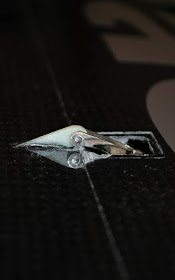Let’s
explode a few myths about control horns on wings: If you want the strongest and
best wearing then look at the horns used on DS planes. They don’t use brass or
aluminium metal ‘rod’ horns, why, because they have very little gluing area and
can be pull out in flight (with sufficient force)! They all use composite horns
with a triangular shape with a big foot for lots of gluing area. With a syringe
you can pump in lots of epoxy inside the surrounding area of the flap or
aileron skin and that in itself makes a huge difference when attaching horns.
DS style
horns aren’t just for DS models of course, standard Opus horns, well, could be improved! and
some of these types of planes like Paces don’t come with horns at all!
You would
imagine then carbon horns would be the best, they are not. Carbon wears very
quickly in the clevis hole, you’ll find very quickly the hole enlarges and you
have play and a sloppy surface.
Real G10
horns are the best, not the cheaper type of fibreglass board that splits and
breaks easily you’ll find used in control horns from some far eastern
manufacturers. The proper stuff is awful to CNC as it wears milling tools out
so quickly but that means they are good and tough for horns! Of course they
will wear (but a drop of cyano will cure) and they can break but I doubt you
will ever pull them out in flight!
I’ve been
using them for a while in high load situations, like DS planes or front side
heavy wind stuff. Here we don’t care about hidden linkages under the skin. You
want decent gearing which means relatively large horns and servo arms that will
protrude from the skin surfaces. However, you don’t need ridiculously outsized
horns and arms like the ones we were finding in DS planes a few years ago. The
bigger the arm the less torque you’ll see from your servo and 10mm-15mm arms
seem to be the optimum for most applications for these types of planes.
You can
make and design your own with a bit of time but to save you the effort we have
2 designs horns that I’ve found will cover most situations. One is 10.5mm tall
and ‘Raked’ 1mm in front of the
hinge line and the other 16.5mm tall with the hole ‘In line’ with the hinge line. You can of course trim them to
reduce horn height for that special application (or just to keep under the horn
shrouds!). It’s milled from 1.6mm G10 and perfect thickness for standard M2,
M2.5 or M3 clevises (any wider would spread the clevis and the pin will not
engage fully on the opposite retaining hole).
They are
available now in pairs of Raked or In line at £3.50 include 1st
class post (and packing) in UK




No comments:
Post a Comment